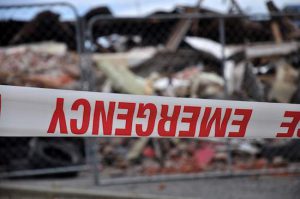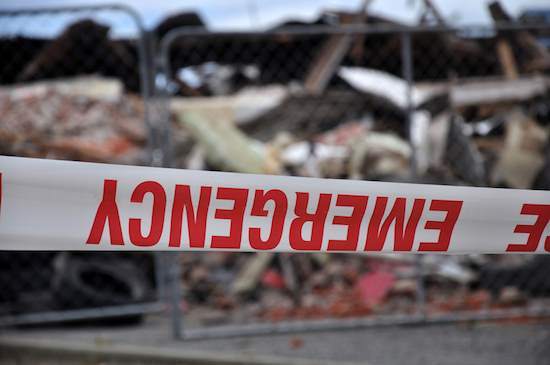
When a storm has passed through your area, storm-chasing contractors are not far behind. They travel from city to city, eager to repair property damaged by wind, hail, floods, hurricanes, fire, earthquakes, etc.
While some may be ethical and provide high-quality workmanship, they’re probably the exception rather than the norm. In this issue of our Buyer Beware series, you’ll learn the typical problems with storm chasers, steps to take to avoid becoming a victim, and where to go to report a scam committed by these fly-by-night con artists…or by any crooked contractor.
Watch out for these storm-chaser traps:
- The approach — The Better Business Bureau (BBB) warns consumers to protect their home, identity, and cash by never working with an unsolicited contractor who shows up at the door.
 The contract — Their contracts typically allow them to deal directly with the insurance company. While this may sound like a handy benefit, the homeowners are waiving their right to make decisions or have input on the materials, type of repair, and replacement of damaged property. Example: The Craigs signed over their rights to have final authority on replacement of their roof. Five years later, the poor-quality installation and substandard materials used forced them to spend over $13,500 to once again replace their roof…only this time, the money came out of their own pocket.
The contract — Their contracts typically allow them to deal directly with the insurance company. While this may sound like a handy benefit, the homeowners are waiving their right to make decisions or have input on the materials, type of repair, and replacement of damaged property. Example: The Craigs signed over their rights to have final authority on replacement of their roof. Five years later, the poor-quality installation and substandard materials used forced them to spend over $13,500 to once again replace their roof…only this time, the money came out of their own pocket.- Specifics — Make sure the agreement spells out specifics on price, materials, completion timeframe, and amount of liability insurance coverage maintained by the contractor. Also, ask for a copy of the current certificate of insurance.
- Approval by insurance carrier — Be sure your contract allows you to cancel the work and receive a refund if the insurance carrier states the work is not covered by your policy. Some states such as Illinois, recently hit with a rash of tornadoes, have implemented legislation that allows homeowners to cancel the repairs within a certain number of business days of a denial by the insurance carrier, and obligates the contractor to return the homeowner’s advance payment, minus emergency repair expenses.
- Payment — Many require payment up front…or at least a substantial portion of it. Avoid working with any contractor who asks for 100% payment before the work is done. The worst of the scam artists immediately disappear with the money, while others stick around, but fail to do the work in a timely manner or meet the expectations of the homeowner. Example: Joseph paid a contractor $700 after he showed up to remove fallen trees and debris following a severe windstorm. After working for an hour, the contractor left to supposedly help his wife with an emergency, promising to return the next day, but instead cashed the check and disappeared with Joseph’s money.
- Quality of work — Many storm chasers increase their profits by using substandard materials. Stay involved in the process and review the materials used for windows, doors, siding, etc., until the work is completed.
- Little recourse for homeowner — Whether the homeowner pays the storm chaser directly or the insurance carrier does, once the work is done and payment is received, the contractors are off to the next area hit by a storm. There’s little recourse for the homeowner to collect a refund or fix a problem if the work was never completed or the quality is poor.
Steps to avoid becoming a victim after a weather emergency:
- Contact your insurance carrier — Identify the work that will be covered and the amount insurance will pay prior to committing to any repair work.
 Notify FEMA immediately — Go to DisasterAssistance.gov or call 800.621.3362 (TTY 800.462.7585) immediately to get on the list if the location of your home has been declared a disaster are
Notify FEMA immediately — Go to DisasterAssistance.gov or call 800.621.3362 (TTY 800.462.7585) immediately to get on the list if the location of your home has been declared a disaster are- Identify local contractors — Get on their waiting list, but be sure to get three or more quotes, as recommended in this BBB Scam Alert. Use one of the many sources for home improvement contractors such as HomeAdvisor.com.
- Ask for the contractor’s credentials — Are they listed as an active business with the Secretary of State, or do they have a contractor permit with your area’s city hall? Also, search for any complaints with the BBB or RipoffReport.com. Example: John asked for references from a contractor hired to repair siding after a storm. Unfortunately, John didn’t realize the rave reviews were phony until the contractor vanished with his money.
- Ignore e-mails and fake Web sites — Scam artists send millions of e-mails every day soliciting different types of home improvement work, and accelerate the spam in targeted disaster areas.
- Don’t open or respond to any unsolicited e-mails.
- File a complaint — To report a scam or complaint, go to BBB.org or FTC.gov.
- Additional resources — Sites for help after a weather emergency: FTC: Scams and Rebuilding, FTC: Home Improvement Tips and Cautions.
We hope these tips help you combat the storm-chaser scams that escalate throughout the spring and summer months.

